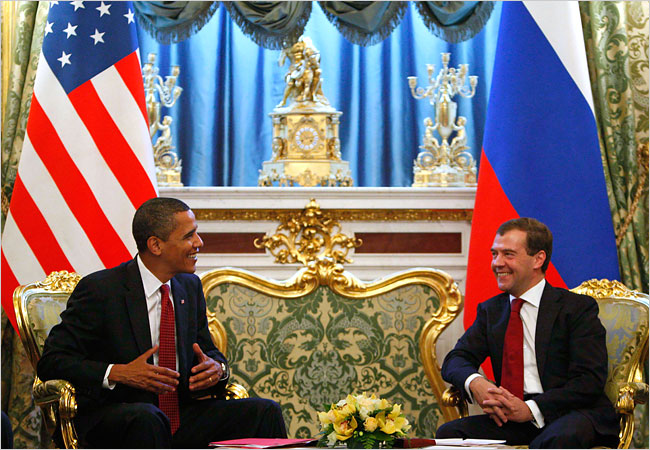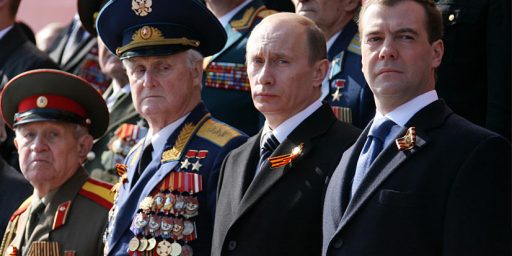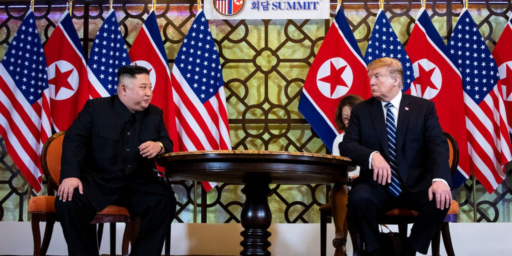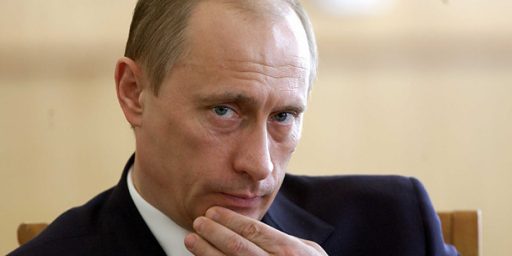Is the World Smiling Back?
 Over the weekend North Korea fired a volley of short range missiles into the Sea of Japan in defiance of UNSC resolutions, heightening tensions between North Korea and its neighbors, South Korea and Japan. The Guardian Council has certified the election results in Iran and President Ahmadinejad and the “hardliners” that he represents seem even more firmly in control of Iran than they were before the election. He blames us and the Brits for the protests against the patently phony election that overwhelmingly returned him to office. Even as the U. S. envoy returns to Venezuela, Venezuela’s President Chavez blames the United States for the coup in Honduras that has ousted its president.
Over the weekend North Korea fired a volley of short range missiles into the Sea of Japan in defiance of UNSC resolutions, heightening tensions between North Korea and its neighbors, South Korea and Japan. The Guardian Council has certified the election results in Iran and President Ahmadinejad and the “hardliners” that he represents seem even more firmly in control of Iran than they were before the election. He blames us and the Brits for the protests against the patently phony election that overwhelmingly returned him to office. Even as the U. S. envoy returns to Venezuela, Venezuela’s President Chavez blames the United States for the coup in Honduras that has ousted its president.
Today President Obama landed in Moscow to meet with Russian President Medvedev and other Russian leaders:
MOSCOW — President Obama arrived in Moscow Monday for a summit meeting with Russian leaders that is aimed at reaching an agreement to cut stockpiles of nuclear warheads, but is also expected to touch on the war in Afghanistan, Iran’s nuclear ambitions, terrorism and the jousting for influence in other former Soviet countries.
The summit meeting comes less than a year after the conflict in Georgia caused the worst tensions between the United States and Russia since the end of the cold war. Mr. Obama has called for a “reset” in relations, and the summit meeting will offer the most telling evidence so far about how difficult it will be to achieve this goal.
In opening remarks at the Kremlin, Mr. Obama and President Dmitri A. Medvedev said they hoped that the meeting would improve relations in both tone and substance. Mr. Obama noted that he and Mr. Medvedev had met previously at the Group of 8 summit meeting in April in London.
“We are confident that we can continue to build off the extraordinary discussions that we had in London,” Mr. Obama said, “and that on a whole host of issues — including security issues, economic issues, energy issues, environmental issues — that the United States and Russia have more in common than they have differences, and that if we work hard during these next few days, that we can make extraordinary progress that will benefit the people of both countries.”
There is no more important bilateral relationship between nations than that between Russia and the United States. Between them the two nations have at least 95% of the world’s nuclear weapons. We literally have the ability to destroy the world.
Unfortunately, there isn’t much basis for a good relationship between Russia and the United States. Russia’s population is dwindling, its economy languishing, it survives largely by selling its natural resources. Russia would be a difficult market for American goods and its natural customer for its oil and gas is Europe. We don’t really need Russia’s cooperation on pressing world issues like climate change.
Russia has had consistent and clear interests over the period of the last 200 years or more: annexing or at least neutralizing its neighbors.
The viewpoint of Russians, expressed neatly by Fyodor Lukyanov in the Russian Gazeta, is that it’s all our fault:
On Moscow’s part, too, there’s a desire to break the deadlock, but Russia doesn’t feel it bears any blame for creating it. A common opinion is that Americans have made a pile of mistakes, so now the ball will be in their court for a long time to come. Moscow doesn’t believe it needs to change anything, but is more than ready to respond more constructively to U.S. proposals. Russian representatives acknowledge that that the climate of negotiations has changed for the better, and so two angry monologues have given way to a difficult dialogue.
There’s a grain of truth to that. When you consider the expansion of NATO membership into some of the countries that made up the old Warsaw Pact, U. S. participation in what many Russians viewed as anti-Slav military actions against Yugoslavia, the overtures made to countries like Georgia or Ukraine in Russias “near abroad”, and the plans to deploy missile defense in the Czech Republic or Poland which Russians characteristically view as being directed against them, the view isn’t completely without basis.
While nuclear arms reduction is certainly a vital interest of the U. S. is it our only interest? Very nearly all that we have to offer Russia other than our own arms reduction is to give them a free hand in their dealings with their neighbors. Is arms reduction important enough to us that we should stand on the sidelines as Russia re-assembles the old Soviet Union or creates a chaotically weak buffer zone around it?
The title of this post was inspired by Clive Crooks’s column in the Financial Times:
So much for soft power. Mr Obama’s friendly outreach to other states — be they hostile, unco-operative or even supposedly friendly — has been no more productive, say the critics. China is about as implacable, North Korea just as deranged, Europe just as feckless. Russia, which Mr Obama visits this week, bullies and bribes its near-abroad with as little finesse as usual. What a surprise: the world is not smiling back.
He is not attacking President Obama’s foreign policy but rather defending it:
In foreign policy, Mr Obama is muddling through. He can do no more. He never exaggerated the transformational power of a handshake. His supporters did, to be sure, and he did not go out of his way to disabuse them. But the oddest thing, after Iran, is where some of those supporters have ended up. They stupidly believed that the president’s face was all it would take to change the world. Suddenly they want him to be less like Barack Obama and more like George W. Bush.
In my experience nearly every president has come into office convinced that the foreign policy mess he inherited is largely the fault of his predecessor and has left office disabused of that notion, largely reaffirming the decisions of his predecessor. Since the collapse of the Soviet Union there have been four different American administrations, two Republican and two Democratic. Each has come into office with the full intention of revitalizing and improving the relationship between Russia and the United States. Three have left office with relations no better than that of his predecessor or possibly even worse. That includes George W. Bush.
What have been constant through the period are Russia’s perceived national interests and the character of Russia’s government. I wish President Obama the very greatest of success in his meetings with President Medvedev. He has his work cut out for him.






There appears to be room for compromise on U.S. placement of nukes in Europe with Russian assistance with non-proliferation in Central Asia.
I think think that the most likely tactic as it has been in the past will be negative reciprocity.
Additionally, it certainly seems to me that it remains to be seen whether Russia views proliferation in Central Asia as a method of extending its reach. If that’s the case the likelihood of compromise looks pretty slim to me.
See this in today’s NYT:
As Obama Visits, Russian TV Alters Take on U.S.
Dave, what is your take on Russia allowing our overflights for the war in Afghanistan?
“The viewpoint of Russians, expressed neatly by Fyodor Lukyanov in the Russian Gazeta, is that it’s all our fault:”
Well that’s good because if Obama and the Russians agree at the start they can move on from there.
First off, it’s a good things for us. It makes things easier than it otherwise might be. From the Russian point of view I think they’re making necessity into a virtue. They’d already lost the bidding war over the Manas base in Kyrgyzstan so we couldn’t be shut out one way or another. May as well get whatever points are available for the move.
They’re not smiling back.
It’s not even freindly.
It’s laughing.
At us.
Well when they read your stuff, sure.
Which, in turn, is precisely why I made the prediction last January about how Obama would vindicate Bush’s WOT policies.
In terms of Russia, however, perhaps somebody can explain to us why this thing today was anything but a lose /lose situation for the US.